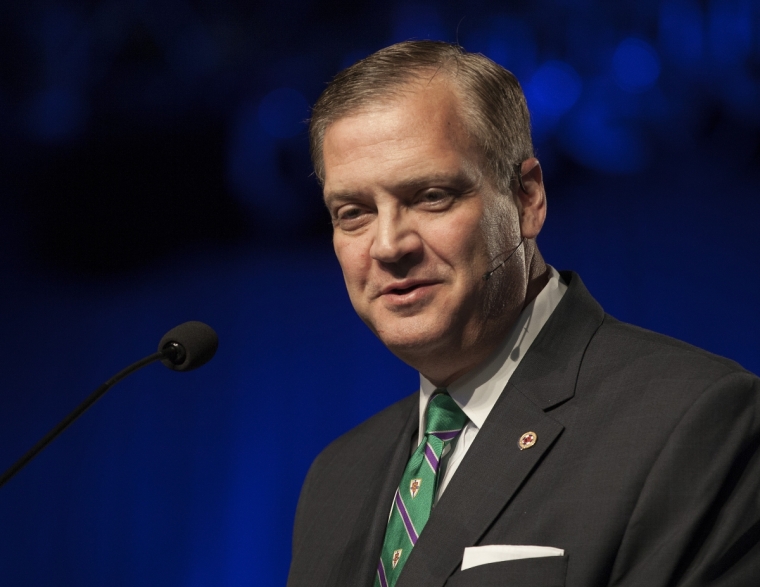Mohler says Pope's climate policy would devastate, not help the poor

LOUISVILLE, Ky. (Christian Examiner) – Pope Francis was right to claim in his encyclical on the environment that creation care is a part of Christian theology, but dead wrong about the importance of fossil fuels for cheap, abundant energy for the developing Third World, Southern Baptist Theological Seminary President Al Mohler said in a statement following the release of the papal document.
"Laudato Si is a very interesting document, by any measure ... As stewards of creation, we are called by the Creator to take care of the world he has made. At the same time, several of the Pope's central claims about climate change have more to do with the current scientific consensus than with theology," Mohler wrote.
Evangelical Christians reject the very idea of the papacy and the concept of the Vatican as a political state. We do not issue encyclicals nor do we claim to represent a sovereign state with a foreign policy. The Pope's encyclical will be much discussed, but time will tell if there is any major policy impact from his arguments.
Mohler, a leading voice within the Southern Baptist Convention on cultural and political issues, said the policies the pope is advocating – an end to the reliance on fossil fuels – will only harm the poor, not help them.
"While fossil fuels are surely contributing to an increase in carbon emissions, it is hardly helpful to tell the poorest nations among us that they must forego immediate needs for refrigeration, modern medicine, and the advances of the modern age that have so extended and preserved life. At this point, there is no alternative to dependency on fossil fuels, and this is as true for the Vatican as for the United States and other advanced economies," Mohler said in the statement.
Mohler said the secular media is ignoring the bulk of Pope Francis' encyclical, especially the areas that pertain to and reinforce Catholic teachings on contraception, population control and gender. Instead, the media seems to be focusing only on the areas that align with the radical green movement, he said.
In any case, Mohler said it is wrong for the pontiff to make a political argument about climate change.
"Evangelical Christians reject the very idea of the papacy and the concept of the Vatican as a political state," Mohler said. "We do not issue encyclicals nor do we claim to represent a sovereign state with a foreign policy. The Pope's encyclical will be much discussed, but time will tell if there is any major policy impact from his arguments."
Mohler later said on his Daily Briefing radio program the pope's encyclical was released purposefully before the United Nations' global summit on climate change in Paris in December and the pope's visit to the United States in September.
"Here you have an entity that claims to be a church and a state with a foreign-policy and with a head of state. That is a huge problem as the Reformers well understood and as we had better understand today," Mohler said on his radio program.
"There is going to be a lot more conversation about Laudato Si to see in coming days. If the Pope intended to start a conversation at the very least we can say he succeeded in that."
Several religious bodies and their leaders are not pushing back, but embracing the pope's encyclical. In fact, the Presbyterian Church USA welcomed the writing.
In a statement on the denomination's website, the PCUSA claimed the pope's political mantra was part of the "faithful witness" of the church.
"We join the Pope in the urgency of truth-telling: we humans are largely responsible for global warming and we have to find ways to reverse track. The Pope is calling us all to environmental conversion: may we together find the immense moral and spiritual energy that the world powers have been lacking so far," the statement from the PCUSA said.
Catholic News Service also reported Lutheran pastor David Beckmann, president of the Christian anti-hunger non-profit Bread for the World, said the pope's encyclical illustrates the "collective moral responsibility of the Catholic Church and all peoples to address climate change" and calls for drawing "a clear link between changing global weather patterns and hunger."
"Pope Francis has laid out a convincing moral argument about why we must confront climate change, especially how it impacts the poor and most vulnerable among us," Beckmann said.
There are secular voices that agree with Mohler. Michael Goodwin, a columnist for the New York Post, wrote that the pope had ventured "too far afield and gets lost in the socialist weeds." He said the Vatican should instead be focused on issues like Christian persecution and genocide, both of which are spreading globally.
"Francis has shaken up the Vatican by showing a common touch, and you don't have to be a Catholic to admire his compassion for the poor and the downtrodden. But his contempt for capitalism and anything resembling the free markets strikes an un-religious chord, and he makes himself easy to dismiss when he complains the earth 'is beginning to look more and more like an immense pile of filth.'"
Goodwin said the encyclical was a utopian vision for the future demanding government redistribution of resources and control of all sectors of life. He also said the pope was logically inconsistent, and even contradictory, condemning the "universal desire for the very fruits he wants to distribute."
Stephen Stromberg wrote at the Washington Post that the pope expressed some positive actions common people could take to reduce the risks of climate change, but he also wrote that the "pope seems to want a fundamental restructuring of the world economy based on spontaneous moral action supplemented by massive spending in the developed world and sledgehammer government mandates from the global level on down, starting with the establishment of a powerful "world political authority."
RELATED ARTICLE: